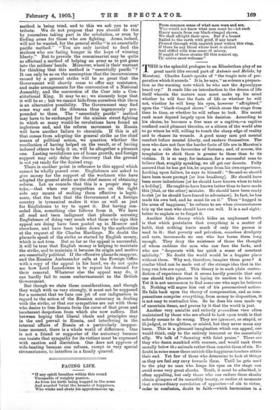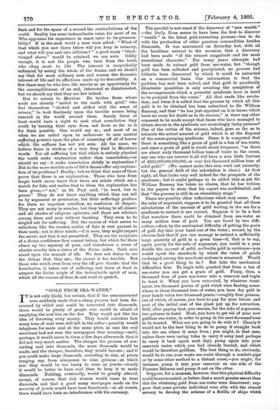As from his birth being hugged in the arms And
nuzzled 'twixt tho breasts of happiness, Who winks and shuts his apprehensions up,
From common sense of what men were and are, Who would not know what men must be—lot such Hurry amain from our black-visaged shows, We shall affright their eyes. But if a breast Nailed to the earth with grief, if any heart Pierced through with anguish pant within this ring, If there be any blood whose heat is choked And stifled with true sense of misery, If aught of these strains fill this consort up, Th' arrive most welcome."
THIS is the splendid prologue to an Elizabethan play of no great merit (the second part of Antonio and Melida, by Marston). Charles Lamb speaks of " the tragic note of pre- paration which it sounds." It is, he says, " as solemn a prepara- tion as the warning note which he who saw the Apocalypse beard cry." It reads like an introduction to the drama of life itself wherein the mature man must make up his mind whether he will face the facts of life or whether he will not, whether he will keep his eyes, however " affrighted," upon the " black-visaged shows " which cross the stage from time to time, or whether he will refuse to look. His moral rank must depend largely upon his decision. According to his choice, he becomes a free man or a captive,—a captive confined amid pleasant theories, or a citizen of the world able to go where he will, willing to touch the sharp edge of reality and to chance its wounds. A good many men put mental comfort before mental liberty, and enslave themselves. The men who dare not face the harder facts of life are in Marston's eyes as a rule the favourites of fortune ; and, of course, the temptation to shirk them is greater to these than to its victims. It is so easy, for instance, for a successful man to believe that, roughly speaking, we all get our deserts. Fully assured that he has got his, be argues from his own experience. Looking upon failure, he says to himself : " So-and-so should have been more prompt [or leas headlong]. He should have been more industrious [or he should have known when to take a holiday]. He•ought to have known better than to have made this [that, or the other] mistake. He should have been ready to risk [or he should have feared to adventure]. In fact, he has made his own bed, and he must lie on it." Thus "hugged in the arms of happiness," he refuses to see when circumstances trip up the man who should have run well. It is a sad sight.: better to explain or to forget it.
Another false theory which bides an unpleasant truth is that which, postulates that everything is a matter of habit, that nothing hurts much if only the person is used to it : that poverty and privation, ceaseless drudgery and care, incommode no one who has borne them long enough. They deny the existence of those the thought of whom saddens the men who can face the facts, and who are " desperate with too quick a sense of constant infelicity." No doubt the world would be a happier place without them. Why not, therefore, imagine them gone ? A similar blind can be made out of the strange idea that in the long run lots are equal. This theory is in such plain contra- diction of experience that it seems hardly possible that any one should take pleasure in laying its unction to his soul. Yet it is not uncommon to find some one who says be believes it. Nothing will argue him out of his preconceived notion. He falls back upon the theory of compensation, and as com- pensations comprise everything, from money to disposition, it is not easy to contradict him. So he does his sum made up of uncertain items, and proves by it that the world is just.
Another very amiable and entirely groundless view often maintained by those who are afraid to look upon truth is that nobody means to do wrong. They are ignorant, or stupid, or ill-judged, or thoughtless, or misled, but they never mean any harm. This is a pleasant imagination which can appeal, one would think, only to the entirely innocent or the essentially silly. We talk of "damning with faint praise." These are they who damn mankind with excuses, and would rank them morally below th .1 animals rather than convict them of sin. No doubt in some sense these ostrich-like happiness-hunters attain their end. Yet few of those who determine to look at things as they are feel any envy towards them. Until he gets used to the play no man who keeps his eyes on the stage can avoid some very great shocks. Truth, it must be admitted, is often appalling, but only those who can endure these shocks obtain glimpses of its unearthly beauty, or realise at moments that extraordinary correlation of opposites—of sin to virtue, order to confusion, doubt to faith—which harmonises in a
flash and for the space of a second the contradictions of the -world. Reality has some indescribable value for moat of us.
Who appraises his experience in exact ratio to its pleasura- bility ? M in the next world a man were asked: " What of that which you saw there below will you keep in memory, and what will you cast into oblivion ? " a good many " black- visaged shows" would be retained, we are sure. Oddly enough, it is not the people who turn from the truth who cling most to life. The interest is unspeakably enhanced by seeing the whole of the drama, and we should say that for most ordinary men and women the dramatic interest of life and its affections made up its desirability. A -few there'imay be who love life merely as an opportunity for the accomplishment of an end, interested or disinterested, but we should say that they are few indeed.
But to return to Marston. He invites those whose souls are already " nailed to the earth with grief," who feel themselves " choked and stifled with the sense of misery," to look fearlessly upon the terrible scenes being enacted in the world around them. Surely these at least would have a right to seek what consolation they could by turning their eyes from sad facts so far as is for them possible. One would say so ; and most of us when we are called upon to endeavour to ease mental suffering proceed upon the plan of screening off all of horror which the sufferer has not yet seen. All the same, we
• believe there is wisdom of a very deep kind in Marston's -words. For all suffering but that which is entirely physical the' world seeks explanation rather than consolation,—or should we say : it seeks consolation chiefly in explanation ? But do the more terrible acts of life's drama offer any explana- tion of its problems ? Hardly ; but we think that some of them prove that there is an explanation. Those who turn from tragic truth never know that there are minds which are a match for fate, and realise that to them the explanation has been given,—" not," as St. Paul said, "in word, but in power." They do not know anything which they can tell us by argument or persuasion, but their sufferings produce for them no impotent rebellion, no confusion of despair. They are not many in number, but they belong to all classes and all shades of religious opinions, and there are scholars among them and men without learning. They seem to be singled out for suffering. But the reason of what seems to onlookers like the wanton malice of fate is ever present to their souls ; not to their minds,—if it were, they might impart the secret, and that is not permitted. They are the recipients of a divine confidence they cannot betray, but which for them clears up the mystery of pain, and transforms a scene of chaotic cruelty into a vision of the divine order. Such men stand upon the summit of life. We dare not desire to see the things that they see ; the ascent is too terrible. But those who watch even from very far off give thanks that the humiliation is taken out of suffering, and learn at least to suspect the divine origin of the indomitable spirit of man, which all the terrors of time do not avail to quench.











































 Previous page
Previous page